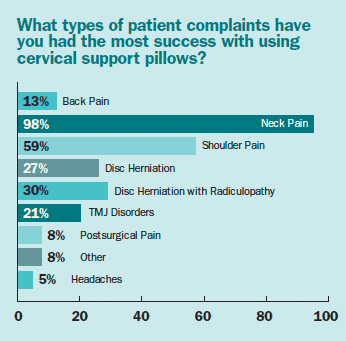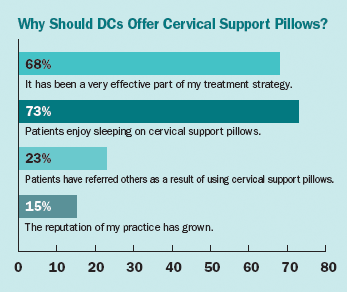It’s a new year and many chiropractors are evaluating what will enhance their respective practices, particularly as it relates to their bottom line. One of the most common questions I get is: “Do I need to be credentialed to bill insurance, and what are the best plans to join?” It’s a loaded question – but one every DC ponders. Whether you're already in-network or pondering whether to join, here's what you need to know.
Cervical Pillows for Every Patient?
Most people lay their head upon a pillow each night. Given its ubiquity and potential cervical support, should a pillow be recommended by a doctor of chiropractic? Dr. William Lichter of Florida believes so: "People spend one-third of their life on their pillow - so why wouldn't you want to have a good one? We treat neck problems. And most people do not have proper support of their neck by their pillow."
A recent national survey of doctors1 revealed many reasons why the recommendation for quality cervical pillows is an important part of every chiropractic practice. Dr. J.L. Higley of Virginia explained that at his practice they see "better outcomes with neck problems using cervical pillows." Dr. Mark Thornton of Florida noted that using cervical pillows "reduces or eliminates acute and chronic neck pain, diminishes patient recovery time, and allows for an improved night's sleep."
Dr. Brenda L. Rooney of New Jersey explained it this way: "Cervical pillows have helped improve my patient's outcome and conditions, such as: TMD, headaches, neck and upper back pain, shoulder pain, and disc herniations with and without radiculopathy.
"Most important is that 90 percent of my patients sleep much better the first night they use the cervical pillow. Ten percent of my patients do have trouble sleeping on the cervical pillow at first," Rooney said. "I explain to those patients that it does take time to get used to sleeping on the cervical pillow and if they find that sleeping on the pillow bothers them at night, that they should remove the cervical pillow and use their original pillow. In addition, I explain to them each night to try to sleep a little longer on the cervical pillow until they get used to it.
"For my practice, patients find that their partners are either trying to steal or share their cervical pillow at night, while they are sleeping. In other words, they end up purchasing a cervical pillow for their partners and then (their partners) become new patients. This helps my practice grow with new patients and educates the new patients about wellness and chiropractic care," she said.
Effectiveness
According to our survey respondents, cervical pillows are effective in addressing numerous patient complaints. For most chiropractors, cervical pillows fit nicely into their chiropractic philosophy. Dr. Stacey Conrad of Indiana stated: "Our practice has a primary focus on posture correction to reduce nerve interference and provide health enhancement. Cervical support and sleeping positions are an integral part of that philosophy."
Another aspect of providing cervical pillows is that they extend the practice beyond the appointment time. Dr. Monty Heisner of Kentucky noticed that "pillows seem to be an important adjunct for certain problems, and they keep patients involved in their treatment program."
Dr. Frank Yanik of Pennsylvania summed it up by saying: "Cervical support pillows offer my patients a way to be proactive in their care. Also, the pillows are a great nightly reminder that chiropractic equals a good night sleep."

[pb]Benefits for the Practice
According to the survey, doctors felt that their practices had benefited on many levels. But not all "cervical pillows" are created equal.
"The pillows out in the market claiming to be 'cervical pillows' are often lacking in quality," said Lynn Knuth DC, of Arizona.
Dr. Kevin McClain of Missouri added: "I know the product and can offer them to patients without having to guess on one they bring in from a store."
Dr. Paul A. Moyse of Connecticut believes that the conversation regarding cervical pillows should be part of the office visit: "Many patients ask my advice and recommendation regarding choice of pillows, and I can provide them an option that they can use immediately, without shopping around."
Cervical pillows can also be a way to remind the patient of the benefits of chiropractic care. "Many of our patients have cervical problems that require appropriate support that the average commercial pillow does not provide. Making cervical pillows available keeps the patient mindful of our desire for their maximum improvement," said Vincent P. Lucido, DC, of Florida.
Recommendations Follow Successes
Generally speaking, the vast majority of DCs who offer cervical pillows to their patients are very pleased with the results. A whopping 97 percent would recommend that other DCs add cervical pillows to their practice.

All of this begs the question: Given the importance of head and neck position during sleep, should cervical pillows be recommended to every patient? In the case of auto accidents, some DCs believe that the answer is yes. Dr. Jaroslava Odvarko of Bettendorf, Iowa stated: "We test the patient to find out if they need [a] cervical pillow. I always use them for any car accident. It speeds up recovery."
The results of the survey show that approximately 30 percent of DCs recommend cervical pillows to at least half of their patients. Of those, 40 percent are successful in that at least half of their patients choose to purchase cervical pillows from them. Included in this figure are 2 percent of respondents who stated that "almost all" of their patients buy cervical pillows from them.
This information suggests that most doctors see cervical pillows as playing a role in the care and support of their patients. Whether they are appropriate for every patient is an individual clinical decision, but the benefits suggest that they should at least be a consideration.
Resource
- Cervical Pillow Survey. MPA Media, completed Jan. 11, 2011.


